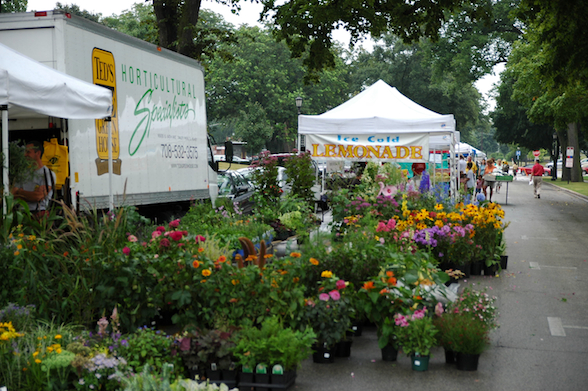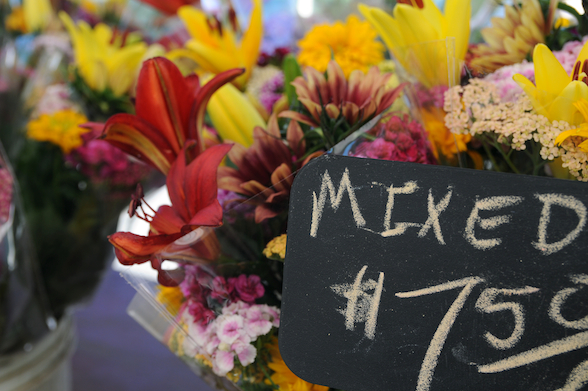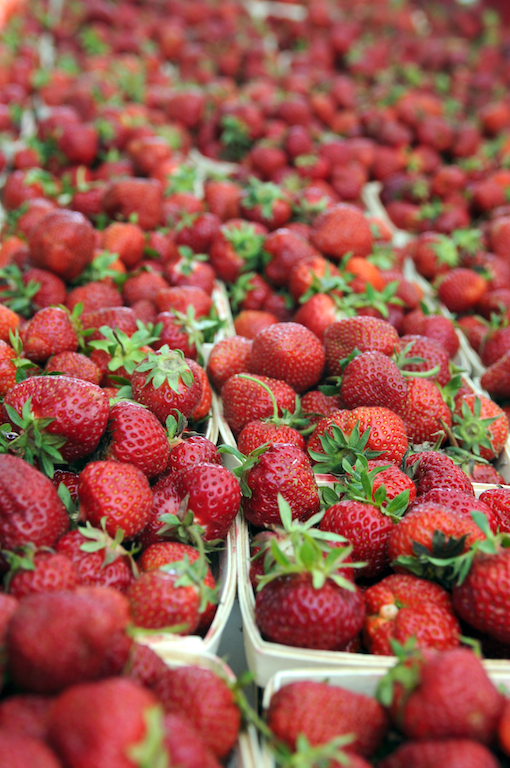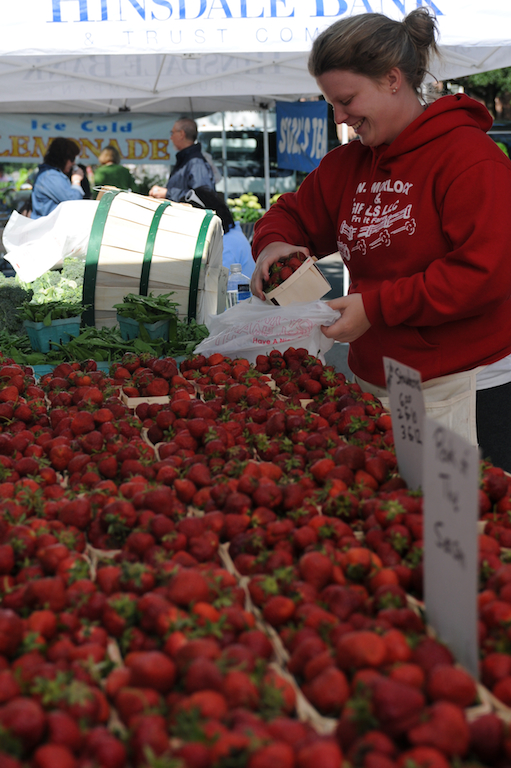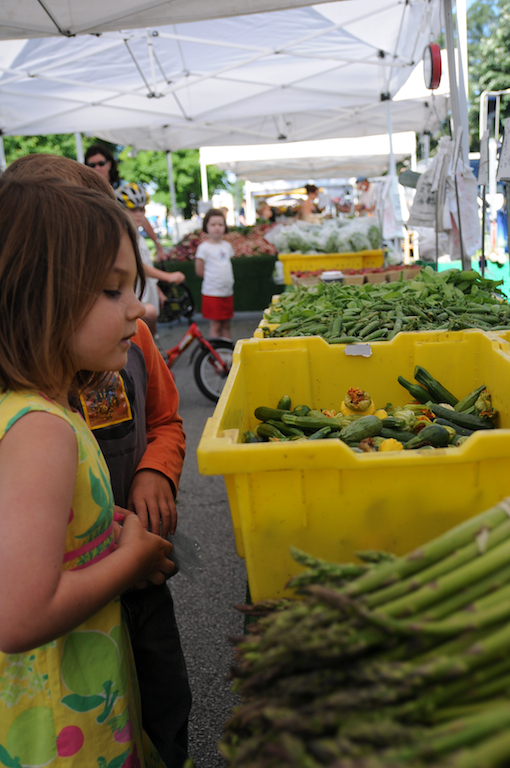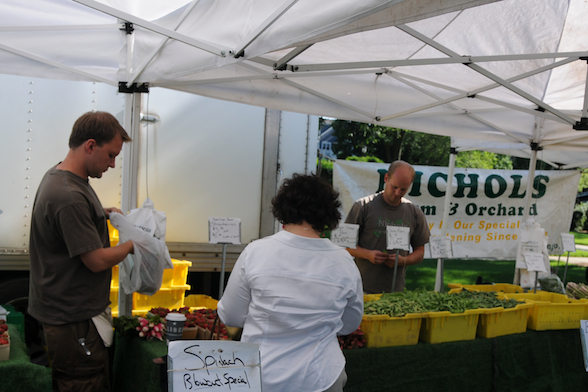My Own Farmer’s Market
My Farmer’s Market opened on Monday. It felt like the first day back at school. I was embarrassingly giddy. The kids were ecstatic to see what goodies would be laid out on the tables. There were a few “new kids-” the honey man has his own stall this year and there was a produce vendor I didn’t remember from last year. I ran into lots of my friends. I caught up with my farmer friends about the happenings of life during the off-season- weddings, births and natural disasters. There’s something about this that feels like a homecoming.
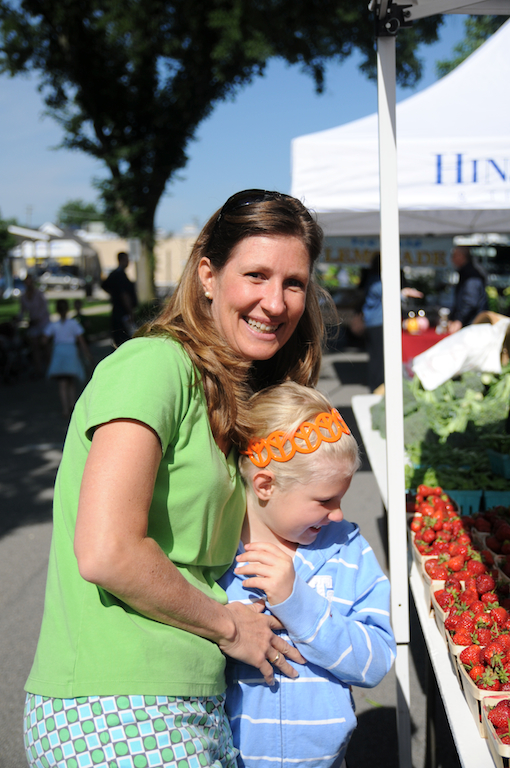
Aside from the food, one of the greatest joys of farmer's market day is the chance encounters with friends. Its like a country club without the fees.
Farmer’s markets can be very intimidating for the uninitiated. They were for me. It took me a year or two to really figure out how to “work” the market. My farmer’s market treks began when I lived in San Francisco. A much ballyhooed farmer’s market had opened up and I was eager to check it out. Perched on San Francisco bay in the shadow of the Bay Bridge with views of the hills beyond and housed in a historic, newly renovated building, this farmer’s market was a real destination. It was like the “foodie club” of America.
Growers offered samples, “teasers” in reality, of heirloom peaches, exotic citrus, apples for baking and brewing and saucing and eating, meats and cheeses. It was so amazing to experience the way that an orange could taste so different in its myriad varieties.
The experience of tasting all of these things had a remarkable impact on my palate. I’d notice the importance of texture on the experience of a flavor. I began to develop a vocabulary for the flavors I reacted to. I started to learn the experience of terroir in all things- the way that the growing environment can be tasted in the food.
I didn’t always buy much because I often wasn’t sure what to do with it. One of the most important outcomes of my farmer’s market treks was the inspiration that came out of it. I wanted to be the kind of person who goes to a market like that, buys what she likes and confidently pulls together menus from her imagination.
When we left San Francisco for Connecticut, I left this joy behind me for two years or so. The farmer’s market in the town we moved to was super-lame and only open for a very short season. It wasn’t until we moved to the Chicago area that I resumed my farmer’s market relationship. Hinsdale has a wonderful market. It’s small, maybe 8 vendors, but it has a great variety.
If you’re not a regular farmer’s market shopper, I’d strongly encourage you to get in the habit. The food tastes amazing. You can try things before you buy them. You can learn a lot about your food by buying it from the people who grow it. It is a wonderful way to connect with your community.
Here are a few tips that will help you make the most of the effort.
Establish a realistic objective for your trip. If you have never spent much time at farmer’s markets, come up with a strategy that feels “doable.” Start small and build confidence and experience.
- Make your first trip a scouting mission.
- Decide to buy just one fruit and one vegetable.
- Decide to buy one vegetable with which you’re familiar and one that is totally new.
- Plan a meal for that night that comes from what you buy that day. Often, those who are daunted by cooking unfamiliar produce postpone the stress of using it until that produce is past its prime.
Sample before you buy.
- This is your assurance that you are getting what you want. It also assures the farmer that you are not going to return to her stall bitching that the apples were too sour to eat, forcing her to delicately explain to you that you purchased an apple only suitable for baking.
- Always ask before sampling and take only small samples.
Scout the market before you start making your purchases.
- Take a look at who’s got what. Nothing’s more frustrating than buying a flat of strawberries and then realizing that the vendor at the end of the row has raspberries and wishing you’d only bought a half-flat of the strawberries.
- Consider prices.
- Look for meal inspirations and build menus around those. I found pea shoots this week and decided one of this week’s dishes would be a dashi-based soup with pea tendrils. I then bought other ingredients that would be nice in that soup.
Don’t think you’re the biggest doofus who has ever walked the market. I’m serious.
- If you don’t know what to do with a zucchini, just ask the vendor. They’re proud of their products, they’re eager to promote them and they’re there to answer your questions. Okay, you might read a little bit of astonishment in the face of a farmer if you ask if the leafy part of a strawberry is edible. Remember, if that same farmer asked you how text messaging works, you’d think that’s a little surprising too.
- You’re not going to learn anything pretending to be an expert. Ask the question and laugh at your ignorance.
Bring your kids.
- This is a great opportunity to build their palates. Take advantage of their curiosity. If they ask what something is, take it home and try it.
- Encourage them to ask questions of the vendors. It is cool when the kids forge their own relationships with the people who grow their food.
- If samples aren’t being proffered, sampling is okay ONLY WITH PERMISSION. No reasonable farmer is going to deny you a sample, but it is just respectful to ask for each sample. If you’re sampling apricots, you sample one. Each person takes a bite of that one. If it’s blueberries, you can each take one. If you just tried the apricots and now want to try a pluot (plum/apricot hybrid), ask permission again before you take the pluot. This is not a smorgasbord. If your kids are freak-out happy with the strawberries and are pleading for another, buy a quart and give them more from your own purchase.
Remember that the produce from the market is different from the stuff you get from the grocery store.
- Vegetables tend to have a longer shelf life. The farm-to-table distance is shorter.
- Fruits tend to have shorter shelf lives. Their varieties are more delicate because they’re grown for flavor, rather than appearance and stability. They’re often picked near peak ripeness, rather than well before they’ve ripened. Unripe fruit is firmer and less apt to damage during handling. The large “farm-to-table” distance means they need more latitude for ripening so the fruit isn’t spoiled within days of being merchandised.
- Ask your vendor about freshness and ripeness. They’ll have the best knowledge about how to ripen stone fruits and how long the black raspberries will last in your fridge. Last year, I spoke with a favorite vendor who bemoaned the frequency with which people return to complain that the fruit they purchased was “bad.” We laughed because a) these people should be sampling before buying and b) the complainers were usually eating unripe fruit.
Build relationships with the vendors. These folks are interesting people and a pleasure to know. They have fantastic information. They can get you specialized stuff. They can cut you deals for large quantities. They will learn your purchasing patterns and may anticipate what you need. They may “reserve” special items for you because they know you’ll enjoy them.
- Spend money. It helps.
- When possible, spread your purchases among a few choice vendors. I have one person from whom I get most of my fruit and one from whom I get most of my veggies. If they have some of the same stuff, I’ll choose to try to equalize my purchases between the two.
- Don’t be black and white about organic certification. There are lots of conscientious farmers who don’t have organic certification. Talk to the farmer to develop insights into her practices and experiences. One of my favorite vendors is not organic. He’s nonetheless very thoughtful about farming and takes great pride in his products.

